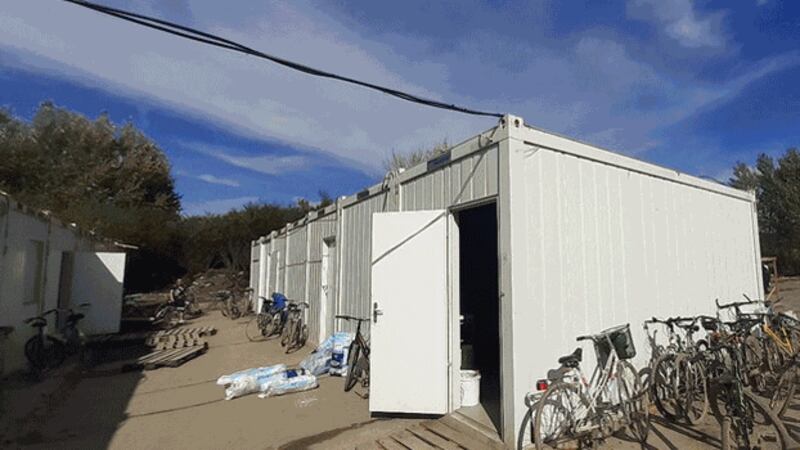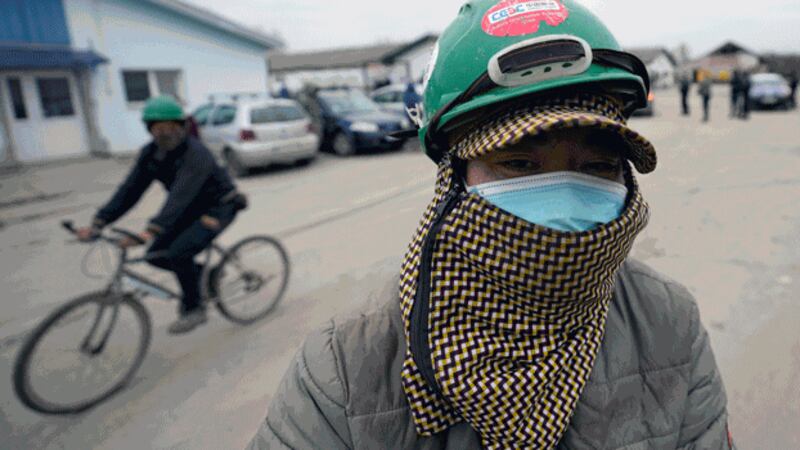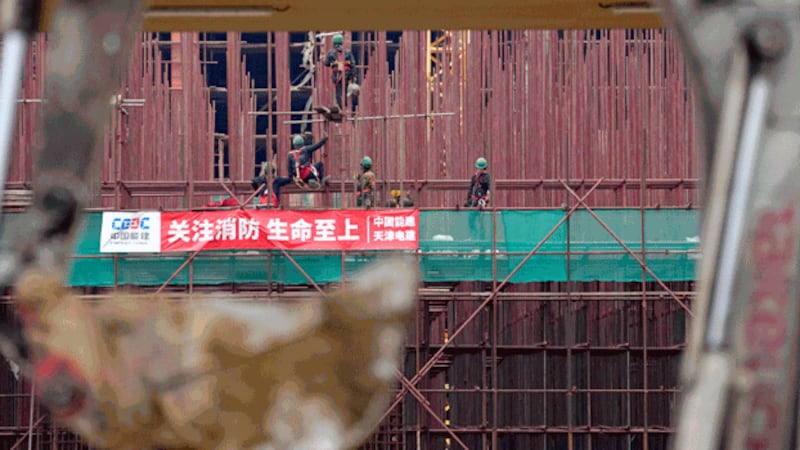The hundreds of Vietnamese who signed contracts with a recruitment agency earlier this year expected to land jobs abroad with higher salaries than what they could ever hope to earn at home.
What they found instead at a Chinese tire factory site in Serbia was misery: low pay, skimpy meals, and living facilities that lacked heat and hot water.
Some of the workers accused the employment agency, Song Hy Gia Lai, of fraud, saying that were told they would be working in Germany, not Serbia, and making more money in jobs less taxing than the demanding construction jobs they ended up doing.
They also accused their employer, China’s Shandong Linglong Tire Co. Ltd., of confiscating their passports to prevent them from leaving and did not pay them on time.
“In general, we don’t have enough food to eat and not enough energy to work,” said one employee who declined to give his name for fear of retribution.
He said he had received only two weeks’ pay for a month of work. Other workers were owed up to four months’ salary, though the company paid what it owed the workers after media reports brought attention to the issue, he said.
“Honestly, it’s a prison-like place. The only thing that makes it better than a prison is that we are allowed to go outside and to see the sky,” the worker said.
Their plight bears the hallmarks of human trafficking and worker exploitation, said human rights groups in Serbia and Vietnam that took up their cause after a local media report exposed their dismal work and living conditions.
“Laborers need to be clearly informed about their contracts,” said Tran Nghia Quan, vice president of the Vietnamese Independent Union, an organization dedicated to protecting workers’ rights and interests.
“In addition, the government needs to put pressure on intermediary companies to make them more accountable as well as to prevent human trafficking,” he said. “The companies should not only find enough laborers to send overseas but also take care of them when they are mistreated.”
Serbia is an important link in China’s Belt and Road Initiative in Europe. The country has reportedly received billions of dollars in preferential loans to pay Chinese firms to modernize the Belgrade-Budapest railway, build a metro system in the capital, and construct other infrastructure and factory projects.
Once built, the Linglong Tire plant will employ about 1,200 workers and produce about 13 million tires annually.
Linglong officials have told Serbian media that they are not responsible for the workers, instead blaming the Vietnamese employment agency that hired them. It also said that it paid workers their monthly salaries according to the number of hours they worked.

Hungry, cold, and sick
About 500 Vietnamese workers arrived at the construction site near the town of Zrenjanin, about 65 kilometers (40 miles) north of Belgrade, in May. Their contracts required them to work nine hours a day for 26 days a month to build the U.S. $900 million factory — the first Chinese car tire factory in Europe.
Workers told RFA that they lived in containers without windows, heat or hot water. Daytime highs only reached around 45 degrees Fahrenheit, and at night, the temperatures dipped to 37 degrees. Each container housed up to a dozen people.
“Without hot water, we did not dare to take a shower at first,” said the first laborer who declined to give his name for fear of retribution. “However, after four or five days, we could not stop ourselves from bathing [with cold water].”
“After that, whoever took a shower, got sick,” he said. “Because we lived in a small and stuffy container, the rest were quickly infected and became ill, too.”
The man said that there had been at least one confirmed case of a worker contracting the COVID-19 virus. None of the ill laborers received medical care, the source said.
“Workers have to use their own money to cover the expenses caused by their accidents, illnesses and COVID-19 infections,” said the same worker. “The company doesn’t pay for anything at all. If we don’t work enough, the Chinese employer will reduce our salaries.”
The employees are often hungry, the source said. Because their location is far from stores, they are unable to purchase meals on their own and have to rely on what the company provided. It often wasn’t enough, the source said.
The worker said that he had eaten the same meal every morning — a bowl of rice and a boiled egg. For lunch, workers ate two to four slices of pork.
Workers have gone on strike twice to protest the conditions. Some of the strikers were fired, including one worker who spoke to reporters, according to local media reports. About 400 Vietnamese workers remain on site.
On Nov. 12, a regional cable news network first aired a story that described the poor living conditions of Vietnamese migrant workers hired to build the tire factory in Zrenjanin.
In response, two Serbian civil society groups — Inicijativa A11, which advocates for workers’ rights, and ASTRA-Anti-Trafficking Action, which fights against human trafficking — visited the construction site and called on Serbian authorities to address the issue.
Rights groups said laborers at the construction site worked longer than the law permits, were not given enough days off, lacked personal protection equipment, were fined for missing work, and had to pay for their own equipment.
Activists in Serbia have filed criminal charges on suspicion of slave labor and human trafficking, according to a report by Deutsche Welle, a state-owned broadcaster in Germany.

‘Conditions are much worse’
Following media reports on the workers, company managers moved the Vietnamese into brick buildings, though issues remain, the first worker said. For example, about 100 people must share three toilets.
Under pressure from human rights groups, the Serbian government sent a labor official to the tire factory construction site to investigate the conditions. But officials have sought to distance the Chinese from any responsibility for the problems. Serbian President Aleksandar Vucic called the reports a “media and political campaign” against China.
Authorities from the Serbian government only spoke with the Chinese at the site but did not examine work and living conditions or talk to the laborers, the Vietnamese workers said.
The Vietnamese Embassy in Romania, which overseesVietnam’s relations with Serbia, also sent representatives to the site to meet with the laborers. But the workers had limited access to them, the first employee said.
The Vietnamese Independent Union (VIU) also contacted the Vietnamese workers in Serbia, said Quan, the group’s vice president.
“Talking directly with the workers, we realized that the conditions are much worse than what the international media has reported,” he told RFA. “We are finding a way to send them some SIM cards and medicine to treat coughs, colds, flus and diarrhea, which they will definitely need in the upcoming winter.”
The VIU has asked a Serbian environmental organization for help in delivering the supplies because the workers don’t have a postal address, he said.
The reports of the poor conditions the laborers were working under has also brought international condemnation. In a Nov. 19 statement, seven members of the European Parliament said they were appalled by the reports of alleged human trafficking and the inhumane conditions of the workers.
“It is completely unacceptable that an aspiring EU Member State tolerates the construction and maintenance of a factory that is reportedly staffed using human trafficking and exploitation on its territory,” the statement said. “The Serbian government’s silence on this forced labor means that they are complicit in modern slavery.”
Following the media reports, the Chinese company returned some of the workers’ passports it had taken, saying it had held them only for processing, Quan said. But not all of the passports have been returned, he said.
The company also asked the workers to sign a document stating that they were satisfied with their accommodations, he said.
“Although their living conditions have not improved, the company asked the workers to sign a document written in English, Chinese and Vietnamese, declaring that they would comply with the company’s rules and that they were statisfied with their accommodations and food,” Quan said. “If they refused to sign, their working time would not be recorded.”
Many workers didn’t want to sign the document, but they had no choice if they wanted their time sheets approved, said the first worker.

‘We are really stuck here’
The job in Serbia was not in line with terms the first worker said he had agreed to when he signed his contract with Song Hy Gia Lai in Vietnam. He said he thought he would be helping to make furniture for U.S. $900 a month, but his contract said his job is tying steel bars for less than U.S. $750 a month.
“When I arrived here, I realized that there was no furniture-making category,” he said. “They put it there only to attract and cheat laborers.”
The employment agency did not tell the laborers they were headed to Serbia and charged them about U.S. $3,000 each, he said. They did not have a chance to read their labor contracts, he said.
“They gave us the labor contract on the afternoon of the day we departed Vietnam,” he said. “The contract came with many different papers, and we did not have time to go through them. We only had enough time to sign them and write in our pledge.”
Some workers said they had signed one-year contracts, but their visas were valid for only 180 days.
“In response to Vietnamese workers’ demands, a representative from the Chinese company said: ‘Do you want to return to Vietnam? You’ll have to wait as we paid 130 million dong (U.S. $5,700) to buy each of you,’” said the first worker.
While they were in Serbia, the workers called Song Hy Gia Lai to request return to Vietnam, but no one answered the phone.
“They even don’t read our messages and don’t want to hear what we have to say,” said another employee. “They don’t care. Perhaps they think their job is done after sending us here.”
VIU also contacted Song Hy Gia Lai to discuss the workers’ request to be sent home, but an employee there said he was busy and asked the organization to call back later, Quan said. Additional calls went unanswered.
RFA could not reach officials at the Vietnamese Embassy in Romania for comment.
Le Thi Thu Hang, spokeswomen for Vietnam’s Ministry of Foreign Affairs, told RFA on Nov. 30 that the country’s mission in Romania has been working with the parties to resolve the issues and is corroborating with the Vietnamese Labor Ministry to protect the workers.
“We are also asking labor export companies [intermediary companies] to strictly implement their agreements with laborers, regularly monitor and timely address emerging issues between laborers and employers,” she said.
More than 147,000 Vietnamese work around the world, according to the Ministry of Labor, Invalids and Social Affairs.
But not all of them are treated based on the terms of their work contracts, Quan said.
“Because no one protects them in the host countries, the workers are at the mercy of their employers,” he said. “Many workers told us that after sending them to their host countries, employment agencies don’t care how their contracts are implemented. They don’t respond when workers make phone calls to them.”
Some of the remaining workers at the factory construction site said they still want to return to Vietnam.
“We really want to return to Vietnam, but we can’t do it now as we have just come here and haven’t got money,” said another laborer. “We want to seek asylum but don’t know whether we can apply for it. We are really stuck here.”
Reported by RFA’s Vietnamese Service. Translated by Anna Vu. Written in English by Roseanne Gerin.
